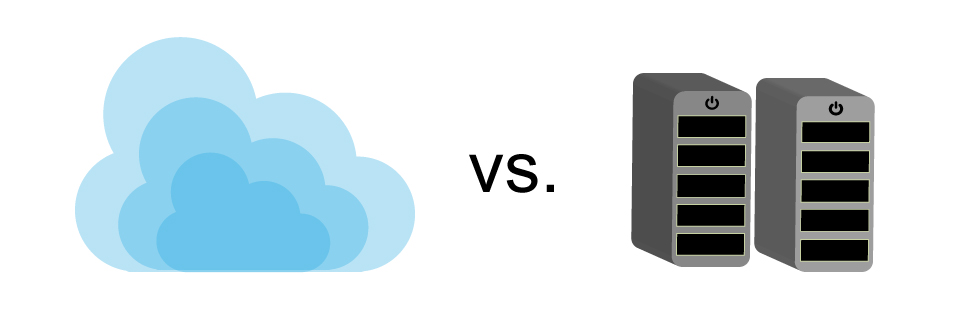
In part 1 we took an in-depth look at dedicated servers, the solution where a company’s data is stored on physical hardware locally (in the building) using custom software. We found this solution to be costly but secure and flexible. In this post we are going to be looking at a new spin on flexibility called cloud computing, an emerging off-site IT solution for all types and sizes of companies. Furthermore, we intend to answer the question: I know cloud computing will work for advanced organizations in larger metros, but is it viable for a company located in Johnson City, Kingsport, or Bristol?
Let’s jump in.
Cloud Storage, Pros & Cons:
Definition: Cloud Storage means that a company’s data from all its users is hosted (stored) on a “virtual” server supplied by a third-party cloud provider off-site and accessed through the web.
Pros
Accessibility
A huge benefit of cloud storage is the ability to access data from any device anywhere there is Internet connectivity. For example, a realtor who relies on a local dedicated server for her data leaves her office to meet with a client. At the meeting, the client asks to see the financial plan for the project. The realtor reaches into her briefcase only to discover she has forgotten the folder in her file cabinet back at her office. The meeting ends.
Another realtor who relies on cloud storage to store her data, leaves her office carrying nothing but her iPad to meet with her client. At the meeting, the client asks to see the financial plan for the project. The realtor says, “Sure,” and opens an app on her iPad, instantly connecting to her cloud storage and displaying the report, as well as other information that client spontaneously asks for. The meeting continues.
The point: a cloud computing solution allows users to access any data through any web-enabled device in any location, removing the limitation of workstation dependency. Businesses that rely on mobility, agility, and real-time data-sharing will find huge benefits in cloud storage.
Scalability
CloudTweaks, a leader in cloud research, writes:
One of the key benefits of using cloud storage is its scalability. Cloud storage allows your business to easily upscale or downscale your IT requirements as and when required. For example, most cloud service providers will allow you to increase your existing resources to accommodate increased business needs or changes. This will allow you to support your business growth without expensive changes to your existing IT systems.
In the past, when web-based companies jumped from a couple thousand users to millions of users, a company would have to scramble for physical servers. The cloud lets this rapid scalability happen by automatically unlocking more server space in the – essentially – infinite reservoir of storage.

Cost
The ability to increase or downsize as needed in a matter of clicks is a huge money-saver, especially for small businesses. With a physical, in-house server system, an increase in IT requirements would mean sinking the cash into new hardware and software. Then, the new hardware and software may be underutilized or even unneeded in a matter of months. Cloud storage makes it easy to scale up or down in server space with greater efficiency and at a fraction of the price.
We compared the pricing of five of the most popular consumer cloud providers.
For a dedicated server system, a company can expect to pay $15,000 – $100,000 depending on size and capability, with ongoing support costs.
For a cloud computing system, can expect to pay $750 – $3,000 per month.
Support
Cloud storage providers have thousands of customers, it can be difficult to get a quick response from them. In this scenario, we recommend working with a local cloud computing company to serve as a liaison to solve technical problems. The benefit here is since the hardware is not on site, IT support will not need to come to your facility to manage the equipment.
Cons
Macro Risk
Cloud computing subjects users to two risks: large-scale data breaches and Internet volatility. Large-scale data breaches are attacks by malicious hackers gaining access to the entirety of a cloud’s data. The Cloud Security Alliance ranked data breaches as the number one top nine threats to cloud computing security. If the architecture of the database is not designed perfectly, a single flaw could expose the data of every tenant.
When searching for a secure cloud service provider, make sure they employ data encryption. Encryption provides an extra level of safety where each file is individually encoded requiring a decryption tool to access.
Connectivity
Lastly, cloud storage data is only accessible through an Internet connection. If the Internet slows down or goes out, your ability to work drags or even desists.
Cloud Storage vs. Dedicated Servers
We’ve looked at the pros and cons of cloud storage and dedicated servers and this is what we’ve found:
- Dedicated servers pros: security, control, and reliability.
- Dedicated servers cons: cost and local risk.
- Cloud storage pros: accessibility, scalability, and cost.
- Cloud storage cons: macro risk and support.
Is there a universal right choice? No. Is their a right choice for your business in Johnson City, Kingsport, or Bristol? Yes. Location does not matter as much (or at all) to do cloud storage as long as there is reliable Internet connectivity.
Talk to us and we’ll walk you through your specific IT requirements and best-fit solutions at no charge.
Learn More About Cloud Services or Contact Us to Get Started

